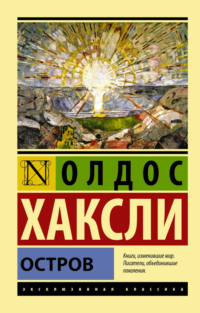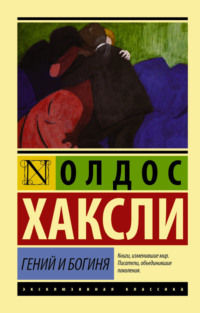
Полная версия
О дивный новый мир / Brave New World
They were standing on the roof; Big Henry had just sung eleven. The night was calm and warm.
“Wasn’t it wonderful?” said Fifi Bradlaugh. “Wasn’t it simply wonderful?” She looked at Bernard with an expression of rapture. Hers was the calm ecstasy of achieved consummation, the peace. A rich and living peace. “Didn’t you think it was wonderful?” she insisted, looking into Bernard’s face with those supernaturally shining eyes.
“Yes, I thought it was wonderful,” he lied and looked away. He was as miserably isolated now as he had been when the service began. Alone even in Morgana’s embrace—much more alone, indeed, more hopelessly himself than he had ever been in his life before. He was utterly miserable, and perhaps (her shining eyes accused him), perhaps it was his own fault. “Quite wonderful,” he repeated; but the only thing he could think of was Morgana’s eyebrow.
Chapter Six
1
Odd, odd, odd, was Lenina’s verdict on Bernard Marx. So odd, indeed, that in the course of the next few weeks she had wondered more than once whether she shouldn’t change her mind about the New Mexico holiday, and go instead to the North Pole with Benito Hoover. The trouble was that she knew the North Pole, had been there with George Edzel only last summer, and found it pretty grim. Added to that, she had only been to America once before. And even then, a cheap week-end in New York. The prospect of flying West again, and for a whole week, was very inviting. Moreover, for at least three days of that week they would be in the Savage Reservation. As an Alpha-Plus psychologist, Bernard was one of the few men she knew entitled to a permit. For Lenina, the opportunity was unique.
“Alcohol in his blood-surrogate,” was Fanny’s explanation of every eccentricity. But Henry, with whom Lenina had rather anxiously discussed her new lover, had compared poor Bernard to a rhinoceros.
“You can’t teach a rhinoceros tricks,” he had explained. “Some men are almost rhinoceroses; they don’t respond properly to conditioning. Poor Devils! Bernard’s one of them. Luckily for him, he’s pretty good at his job. Otherwise the Director would never have kept him. I think he’s pretty harmless.”
Pretty harmless, perhaps; but also pretty disquieting. That mania, to start with, for doing things in private. Which meant, in practice, not doing anything at all. For what was there that one could do in private. (Apart, of course, from going to bed: but one couldn’t do that all the time.) The first afternoon they went out together was particularly fine. Lenina had suggested a swim at Toquay Country Club followed by dinner at the Oxford Union. But Bernard thought there would be too much of a crowd. Then what about a round of Electro-magnetic Golf at St. Andrew’s? But again, no: Bernard considered that Electro-magnetic Golf was a waste of time.
“Then what’s time for?” asked Lenina in some astonishment.
Apparently, for going walks in the Lake District. “Alone with you, Lenina.”
“But, Bernard, we shall be alone all night.”
Bernard blushed and looked away. “I meant, alone for talking,” he mumbled.
“Talking? But what about?”
In the end she persuaded him, much against his will, to fly over to Amsterdam to see the Women’s Heavyweight Wrestling Championship.
“In a crowd,” he grumbled. “As usual.” He remained gloomy the whole afternoon; wouldn’t talk to Lenina’s friends and refused to take the half-gramme raspberry soma sundae. “I’d rather be myself,” he said. “Myself and nasty. Not somebody else, however jolly.”
Lenina shrugged her shoulders. “A gramme is always better than a damn,” she concluded with dignity, and drank the sundae herself.
On their way back across the Channel, Bernard insisted on stopping his propeller and hovering within a hundred feet of the waves. The weather had taken a change for the worse; a south-westerly wind had sprung up, the sky was cloudy.
“Look,” he commanded.
“But it’s horrible,” said Lenina, shrinking back from the window. She was appalled by the rushing emptiness of the night, by the black water beneath them, by the pale face of the moon. “Let’s turn on the radio!”
“I want to look at the sea in peace,” he said. “One can’t even look with that beastly noise going on.”
“But I don’t want to look.”
“But I do,” he insisted. “It makes me feel as though I am … more. More on my own, not a part of something else.”
Lenina was crying. “It’s horrible, it’s horrible,” she kept repeating. “And how can you talk like that about not wanting to be a part of the social body? After all, everyone works for everyone else. We can’t do without anyone. Even Epsilons…”
“Yes, I know,” said Bernard. “‘Even Epsilons are useful’! So am I. And I damned well wish I weren’t!”
“Bernard, you’re saying the most awful things.”
“Don’t you wish you were free, Lenina?”
“I don’t know what you mean. I am free. Free to have the most wonderful time. Everybody’s happy nowadays.”
He laughed, “Yes, ‘Everybody’s happy nowadays.’ Wouldn’t you like to be free to be happy in some other way, Lenina? In your own way; not in everybody else’s way.”
“I don’t know what you mean,” she repeated. “Oh, do let’s go back, Bernard. I do so hate it here.”
“Don’t you like being with me?”
“I do, Bernard. It’s this horrible place.”
“I thought we’d be more … more together here. More together than in that crowd, or even in my rooms. Don’t you understand that?”
“I don’t understand anything,” she said with decision. “Nothing. Least of all, why you don’t take soma when you have these dreadful ideas of yours.”
He looked at her in silence, his face unresponsive and very grave. After a few seconds Lenina’s eyes flinched away; she uttered a nervous little laugh, tried to think of something to say and couldn’t. The silence prolonged itself.
When Bernard spoke at last, it was in a small tired voice. “All right then,” he said, “we’ll go back.” And stepping hard on the accelerator, he sent the machine up into the sky. They flew in silence for a minute or two. Then, suddenly, Bernard began to laugh.
“Feeling better?” she asked.
For answer, he lifted one hand from the controls and, slipping his arm around her, began to fondle her breasts.
“Thank Ford,” she said to herself, “he’s all right again.”
Half an hour later they were back in his rooms. Bernard swallowed four tablets of soma, turned on the radio and television and began to undress.
“Well,” Lenina enquired, with when they met next afternoon on the roof, “did you think it was fun yesterday?”
Bernard nodded. They climbed into the plane. A little jolt, and they were off.
“Everyone says I’m awfully plump,” said Lenina, patting her own legs.
“Awfully.” But there was an expression of pain in Bernard’s eyes. “Like meat,” he was thinking.
She looked up with a certain anxiety. “But you don’t think I’m too plump, do you?”
He shook his head. Like so much meat.
“You think I’m all right.” Another nod. “In every way?”
“Perfect,” he said aloud. And inwardly. “She thinks of herself that way. She doesn’t mind being meat.”
“All the same,” he went on, after a little pause, “I still rather wish it had all ended differently. I didn’t want it to end with our going to bed. Not at once, not the first day.”
“But then what …?”
He began to talk a lot of incomprehensible and dangerous nonsense. Lenina did her best to stop the ears of her mind; but every now and then a phrase would insist on becoming audible.
“I want to know what passion is,” she heard him saying. “I want to feel something strongly.”
“When the individual feels, the community reels,” Lenina pronounced.
“Well, why shouldn’t it reel a bit?”
“Bernard!”
“Adults intellectually and during working hours,” he went on. “Infants where feeling and desire are concerned. It might be possible to be an adult all the time.”
“I don’t understand.” Lenina’s tone was firm.
“I know you don’t. And that’s why we went to bed together yesterday—like infants—instead of being adults and waiting.”
“But it was fun,” Lenina insisted. “Wasn’t it?”
“Oh, the greatest fun,” he answered, but in a voice so mournful, that Lenina felt all her triumph suddenly evaporate.
“I told you so,” was all that Fanny said. “It’s the alcohol they put in his surrogate.”
“All the same[25],” Lenina insisted. “I do like him. But I wish he weren’t so odd.”
2
Stopping for a moment outside the door of the Director’s room, Bernard drew a deep breath. He knocked and entered.
“A permit for you to sign, Director,” he said as airily as possible, and laid the paper on the writing-table.
The Director glanced at him sourly. But the stamp of the World Controller’s Office was at the head of the paper and the signature of Mustapha Mond, bold and black, across the bottom. Everything was perfectly in order. The director had no choice. He signed and was about to return the paper without a word of comment, when his eye was caught by something written in the permit.
“For the New Mexican Reservation?” he said, and his face expressed a kind of agitated astonishment.
Surprised by his surprise, Bernard nodded. There was a silence.
The Director leaned back in his chair, frowning. “How long ago was it?” he said, speaking more to himself than to Bernard. “Twenty years, I suppose. Twenty-five. I must have been your age…” He sighed and shook his head.
“I had the same idea as you,” the Director was saying. “Wanted to have a look at the savages. Got a permit for New Mexico and went there for my summer holiday. With the girl I was having at the moment. She was a Beta-Minus, and I think” (he shut his eyes), “I think she had yellow hair. Well, we went there, and we looked at the savages, and we rode about on horses and all that. And then—it was almost the last day of my leave … well, she got lost. She must have gone for a walk, alone. At any rate, when I woke up, she wasn’t there. And the most frightful thunderstorm I’ve ever seen was just bursting on us. I searched and I shouted and I searched. But there was no sign of her. The next day there was a search. But we couldn’t find anything. She must have fallen into a gully somewhere; or been eaten by a mountain lion. Ford knows. Anyhow it was horrible. It upset me very much at the time, more than it ought to have done, I dare say. Because, after all, it’s the sort of accident that might have happened to anyone. I actually dream about it sometimes,” the Director went on in a low voice. “Dream of being woken up by thunder and finding her gone; dream of searching and searching for her under the trees.” He fell silent.
“You must have had a terrible shock,” said Bernard, almost enviously.
At the sound of his voice the Director started into a guilty realization of where he was; shot a glance at Bernard, and averting his eyes, blushed darkly. Then he looked at him again with sudden suspicion and anger. “Don’t imagine,” he said, “that I’d had any relation with the girl. Nothing emotional, nothing long-drawn. It was all perfectly healthy and normal.” He handed Bernard the permit. “I really don’t know why I bored you with this story.” Furious with himself for having given away a discreditable secret, he vented his rage on Bernard. “And I should like to take this opportunity, Mr. Marx,” he went on, “to say that I’m not at all pleased with the reports I receive of your behaviour outside working hours. I have the good name of the Centre to think of. My workers must be above suspicion, particularly those of the highest castes. And so, Mr. Marx, I give you fair warning.” The Director’s voice was the expression of the disapproval of Society itself. “If ever I hear again of any lapse from a proper standard of infantile decorum, I shall ask for your transference to a Sub-Centre—preferably to Iceland. Good morning.” And swivelling round in his chair, he picked up his pen and began to write.
“That’ll teach him,” he said to himself. But he was mistaken. Bernard left the room elated by the feeling of his individual significance and importance. Even the thought of persecution didn’t bother him. He felt strong enough to face even Iceland. Walking along the corridor, he actually whistled.
3
The journey was quite uneventful. The Blue Pacific Rocket was two and a half minutes early at New Orleans, lost four minutes in a tornado over Texas, but was able to land at Santa Fe less than forty seconds behind schedule time.
“Not so bad,” Lenina conceded.
They slept that night at Santa Fe. The hotel was excellent—incomparably better, for example, than that horrible Aurora Bora Palace in which Lenina had suffered so much the previous summer. Liquid air, television, vibro-vacuum massage, radio, boiling caffeine solution, hot contraceptives, and eight different kinds of scent were laid on in every bedroom. The synthetic music plant was working as they entered the hall and left nothing to be desired. A notice in the lift announced that there were sixty Escalator-Squash-Racket Courts in the hotel, and that Obstacle and Electro-magnetic Golf could both be played in the park.
“But it sounds simply too lovely,” cried Lenina. “I almost wish we could stay here. Sixty Escalator-Squash Courts…”
“There won’t be any in the Reservation,” Bernard warned her. “And no scent, no television, no hot water even. If you feel you can’t stand it, stay here till I come back. You mustn’t come to the Reservation unless you really want to.”
“But I do want to.”
“Very well, then,” said Bernard; and it was almost a threat.
Their permit required the signature of the Warden of the Reservation, at whose office next morning they duly presented themselves. They were admitted almost immediately.
The Warden was a blond Alpha-Minus, short, red, moon-faced, and broad-shouldered, with a loud booming voice. Once started, he went on and on—boomingly.
“… five hundred and sixty thousand square kilometres, divided into four distinct Sub-Reservations, each surrounded by a high-tension wire fence.”
At this moment, and for no apparent reason, Bernard suddenly remembered that he had left the Eau de Cologne tap in his bathroom wide open and running.
“… supplied with current from the Grand Canyon hydro-electric station.”
“Cost me a fortune by the time I get back. Quickly telephone to Helmholtz Watson.”
“… upwards of five thousand kilometres of fencing at sixty thousand volts.”
“You don’t say so,” said Lenina politely, not knowing in the least what the Warden had said, but taking her cue from his dramatic pause. When the Warden started booming, she had swallowed half a gramme of soma, and now could sit serenely, not listening, thinking of nothing at all.
Конец ознакомительного фрагмента.
Текст предоставлен ООО «ЛитРес».
Прочитайте эту книгу целиком, купив полную легальную версию на ЛитРес.
Безопасно оплатить книгу можно банковской картой Visa, MasterCard, Maestro, со счета мобильного телефона, с платежного терминала, в салоне МТС или Связной, через PayPal, WebMoney, Яндекс.Деньги, QIWI Кошелек, бонусными картами или другим удобным Вам способом.
Примечания
1
Kept at blood heat – поддерживаемые при температуре крови (=37°С)
2
Bokanovsky’s Process – метод Бокановского
3
a bokanovskified egg – яйцо, подвергнутое бокановскизации
4
arrest of development – замедление развития
5
bokanovskify – бокановскизировать
6
They can only stand red light – Они могут выносить только красный свет
7
at the rate of thirty-three and a third centimetres an hour – со скоростью 33,3 см/ч
8
Ass! – Кретин!
9
postulated a mutation to account for it – предположил, что в этом виновата мутация
10
setting out bowls of roses – расставляли горшки роз
11
stiffened to attention – замерли в ожидании
12
as if to the tug of unseen wires – как будто кто-то тянул за невидимые нити
13
to consume transport – использовать транспорт, покупать собственные средства передвижения
14
we see to it – мы устраиваем все так
15
was lost to sight – скрылась из виду
16
rather pointedly – специально, показательно
17
Those who feel themselves despised do well to look despising. – Презирающих тебя сам встречай презрением.
18
you may well shudder – меня тоже передергивает
19
feeling rather out of sorts – не очень хорошо себя чувствую
20
between the consciousness of a desire and its fulfillment – между возникновением желания и его удовлетворением
21
«Чем старое чинить, лучше новое купить.»
22
table-topped buildings – здания с плоскими крышами
23
bottled as she was – несмотря на дурман
24
sounded the hour – пробил
25
All the same – Все равно













